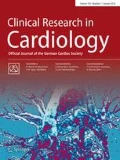Abstract
Background
The Leriche syndrome with contiguous total occlusions of the infrarenal aorta and the iliac arteries is a variant of Trans-Atlantic Inter-Society Consensus (TASC) type D aortoiliac disease, for which surgery is the recommended treatment of choice. We sought to prospectively assess the feasibility and safety of an endovascular therapeutic approach.
Methods
Eleven consecutive patients with Leriche syndrome (eight men; 64 ± 12 years) constituted the study cohort. The treatment strategy consisted of recanalization by transbrachial access of the occluded segments and subsequent transfemoral angioplasty with selective stent placement in the distal aorta and primary nitinol stent placement in the iliac arteries.
Results
Bilateral endovascular success was achieved in eight patients (73%), unilateral success in the other three patients. Seven patients received aortic stents; the total stented segment length in 19 iliac arteries successfully recanalized amounted to a median of 18 cm (range 12–26 cm). There was one periprocedural complication, an acute thrombotic aortoiliac occlusion managed by thrombolysis. One patient with unilateral endovascular success had to undergo femorofemoral crossover bypass grafting. At a median of 14 months, significant hemodynamic improvement was observed in successfully revascularized legs (ankle-brachial index, 0.79 ± 0.20 vs. 0.48 ± 0.08 at baseline; P = 0.0004); walking capacity as well as Rutherford category of peripheral arterial disease had improved in all patients.
Conclusions
In this small series of patients with Leriche syndrome, the reconstruction of the totally occluded aortoiliac bifurcation by endoluminal means was shown to be feasible and safe and associated with excellent mid-term clinical outcomes.







Similar content being viewed by others
References
Bean WJ, Rodan BA, Thebaut AL (1985) Leriche syndrome: treatment with streptokinase and angioplasty. AJR Am J Roentgenol 144:1285–1286
Bosch JL, Hunink MG (1997) Meta-analysis of the results of percutaneous transluminal angioplasty and stent placement for aortoiliac occlusive disease. Radiology 204:87–96
Brewster DC (1997) Current controversies in the management of aortoiliac occlusive disease. J Vasc Surg 25:365–379
Burgess CM (1959) Treatment of the Leriche syndrome: a technique of endarterectomy. Arch Surg 79:487–492
Cooley DA, Creech O Jr, De Bakey ME (1956) The Leriche syndrome and its surgical treatment by resection and homograft replacement. Lyon Chir 52:402–411
Dos Santos JC (1947) Sur la désobstruction des thromboses artérielles anciennes. Mem Acad Chir (Paris) 73:409–411
Erskine JM, Gerbode FL, French SWIII, Hood RM (1959) Surgical treatment of thrombotic occlusion of aorta and iliac arteries; the Leriche syndrome. AMA Arch Surg 79:85–93
Trial Participants EVAR (2005) Endovascular aneurysm repair versus open repair in patients with abdominal aortic aneurysm (EVAR trial 1): randomised controlled trial. Lancet 365:2179–2186
Garcia FC, Gard PD Jr (1979) Leriche syndrome: review of the literature and a case report. J La State Med Soc 131:263–265
Graham R (1814) Case of obstructed aorta. Communicated by Sir G. Blane. [Sir Gilbert Blane, 1747–1834]. Medico-Chirurgical Transactions, London
Katzenschlager R, Ahmadi A, Koppensteiner R, Minar E, Stümpflen A, Ugurluoglu A, Ehringer H (1996) Leriche syndrome: treatment with local lysis and subsequent percutaneous transluminal angioplasty. Vasa 25:180–183
Krankenberg H, Schlüter M, Steinkamp HJ, Bürgelin K, Scheinert D, Schulte KL, Minar E, Peeters P, Bosiers M, Tepe G, Reimers B, Mahler F, Tübler T, Zeller T (2007) Nitinol stent implantation versus percutaneous transluminal angioplasty in superficial femoral artery lesions up to 10 cm in length: the femoral artery stenting trial (FAST). Circulation 116:285–292
Leriche R (1923) Des obliterations artérielles hautes (oblitération de la terminaison de l’aorte) comme causes des insuffisances circulatoires des membres inférieurs. Bull Mem Soc Chir Paris 49:1404–1406
Leriche R (1940) De la résection du carrefour aortico-iliaque avec double sympathectomie lombaire pour thrombose artéritique la l’aorte: le syndrome de l’oblitération termino-aortique par artérite. Presse Med 48:601–607
Leville CD, Kashyap VS, Clair DG, Bena JF, Lyden SP, Greenberg RK, O’Hara PJ, Sarac TP, Ouriel K (2006) Endovascular management of iliac artery occlusions: extending treatment to TransAtlantic Inter-Society Consensus class C and D patients. J Vasc Surg 43:32–39
Marty AT, Penkava R, Whitehead D, Hachmeister C (1985) Kissing balloon therapy for Leriche syndrome. Indiana Med 78:288–289
Murphy TP, Ariaratnam NS, Carney WI Jr, Marcaccio EJ, Slaiby JM, Soares GM, Kim HM (2004) Aortoiliac insufficiency: long-term experience with stent placement for treatment. Radiology 231:243–249
Norgren L, Hiatt WR, Dormandy JA, Nehler MR, Harris KA, Fowkes FG, TASC II Working Group (2007) Inter-Society Consensus for the Management of Peripheral Arterial Disease (TASC II). J Vasc Surg 45(Suppl S):S5–S67
Oudot J (1951) Greffe de la bifurcation aortique depui les artères rénales jusqu’aux artères iliaques pour thrombose artéritique. Mem Acad Chir (Paris) 77:642–644
Scheinert D, Schröder M, Balzer JO, Steinkamp H, Biamino G (1999) Stent-supported reconstruction of the aortoiliac bifurcation with the kissing balloon technique. Circulation 100(19 Suppl):II295–II300
Schröder M, Friedrich K, Zipfel B, Gutberlet M, Möckel M (2007) Acute painless paraplegia of the legs as a manifestation of extensive acute Leriche syndrome. Clin Res Cardiol 96:240–242
Sugimoto T, Ogawa K, Asada T, Mukohara N, Higami T, Obo H, Gan K, Kitano I, Izumi Y (1997) Leriche syndrome. Surgical procedures and early and late results. Angiology 48:637–642
Velasquez G, Castaneda-Zuniga W, Formanek A, Zollikofer C, Barreto A, Nicoloff D, Amplatz K, Sullivan A (1980) Nonsurgical aortoplasty in Leriche syndrome. Radiology 134:359–360
Author information
Authors and Affiliations
Corresponding author
Rights and permissions
About this article
Cite this article
Krankenberg, H., Schlüter, M., Schwencke, C. et al. Endovascular reconstruction of the aortic bifurcation in patients with Leriche syndrome. Clin Res Cardiol 98, 657–664 (2009). https://doi.org/10.1007/s00392-009-0052-y
Received:
Accepted:
Published:
Issue Date:
DOI: https://doi.org/10.1007/s00392-009-0052-y




